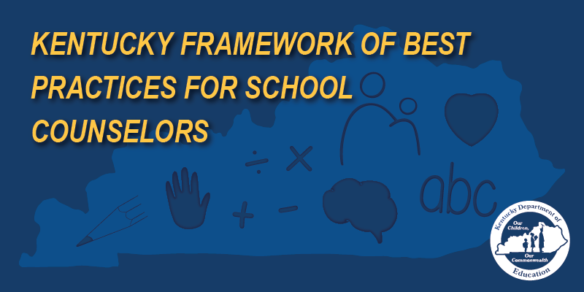
By Sky Carroll
sky.carroll@education.ky.gov
Although many schools across Kentucky have a counselor, daily tasks and responsibilities can look a little different from school to school.
In an effort to help schools and counselors better understand exactly what they should be doing in their role, the Kentucky Department of Education (KDE) released “Kentucky Framework of Best Practices for School Counselors,” on June 2, the first of its kind in the Commonwealth.
Damien Sweeney, KDE’s program coordinator for comprehensive school counseling in the Office of Teaching and Learning, is one of many contributors to the document. He said creating the framework was a two-year process and incorporated input from university program directors and school counselors all over Kentucky.
“Releasing the Kentucky Framework of Best Practices for School Counselors is a breakthrough in Kentucky,” said Sweeney. “It will help school counselors across the state become aligned in their roles and will clarify what it is school counselors should be doing for school administrators and other stakeholders.”
The Kentucky Counselor Standards Advisory Committee defines a Kentucky school counselor as “a certified mental health professional supporting all K-12 students in their social/emotional, academic and career development. Through a Comprehensive School Counseling Program, counselors provide data-informed, universal and targeted learning experiences to develop the whole child in a diverse society.”
Michelle Sircy, director of school counseling for Jefferson County Public Schools, is one of the framework contributors. Sircy sees the framework as a chance for Kentucky counselors to “reflect and realign.”
“It also helps guide school and district leaders to better utilize our school counselors by realigning their roles and responsibilities to meet the immediate needs of our students,” Sircy said.
Sweeney, among others, recognizes the inconsistencies of counselor roles throughout Kentucky schools and hopes the framework will help address some of those gaps.
He said that for far too long, school counselors have performed roles that are on the inappropriate side of a chart from the American School Counselor Association, titled “Appropriate and Inappropriate Activities for School Counselors.”
“This detracts from the ability school counselors have to help all children,” he said. “We should see so many more school counselors getting into classrooms and leading lessons using social and emotional learning because of this work.”
The framework is part of a larger effort to increase Comprehensive School Counseling in Kentucky. Comprehensive School Counseling seeks to help all school counselors provide more effective counsel to better support students and their achievements.
“Our school counselors are highly trained professionals ready to meet the complex needs of our learners at each level,” said Sircy. “This document will help guide their work so that systemically we are unified and all components of school counseling are met.”
Further, Comprehensive School Counseling identifies three core values: college and career readiness; opportunity and access; and social, emotional and behavioral health.
Among other directives in the framework, Sweeney believes that Kentucky schools should see more individual and small group counseling.
He said he is confident the framework is an essential step in improving school counseling in Kentucky and increasing care for the “whole student.”




Leave A Comment